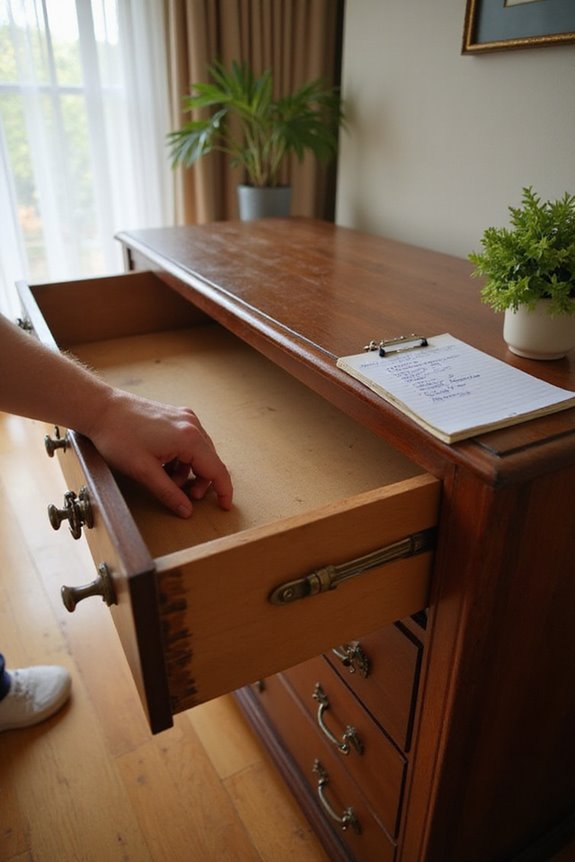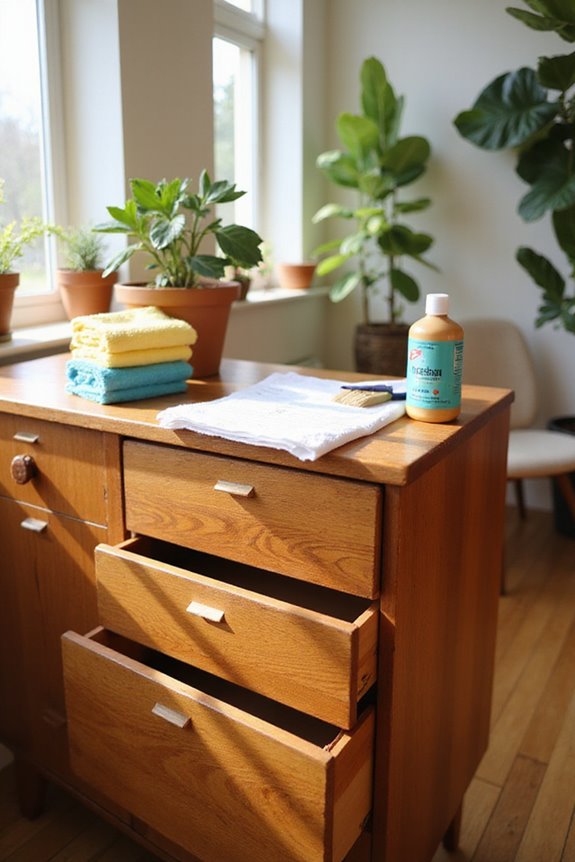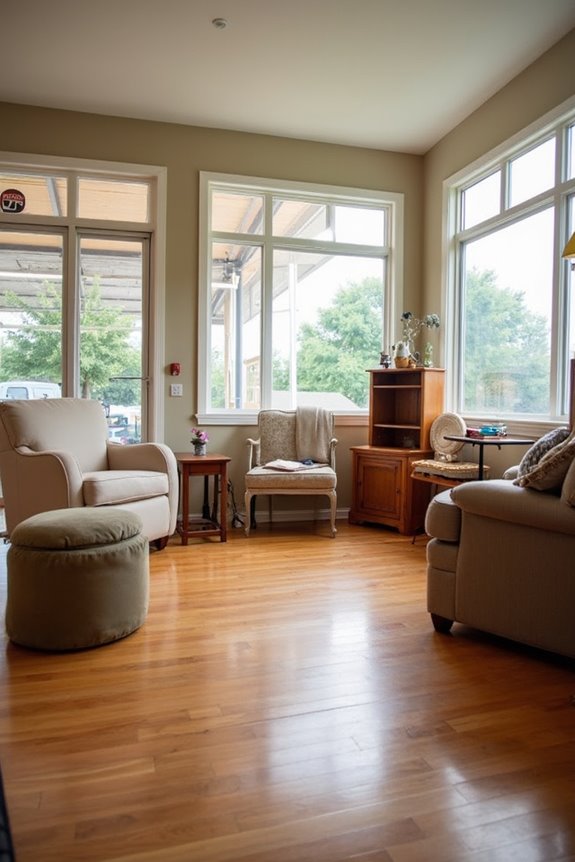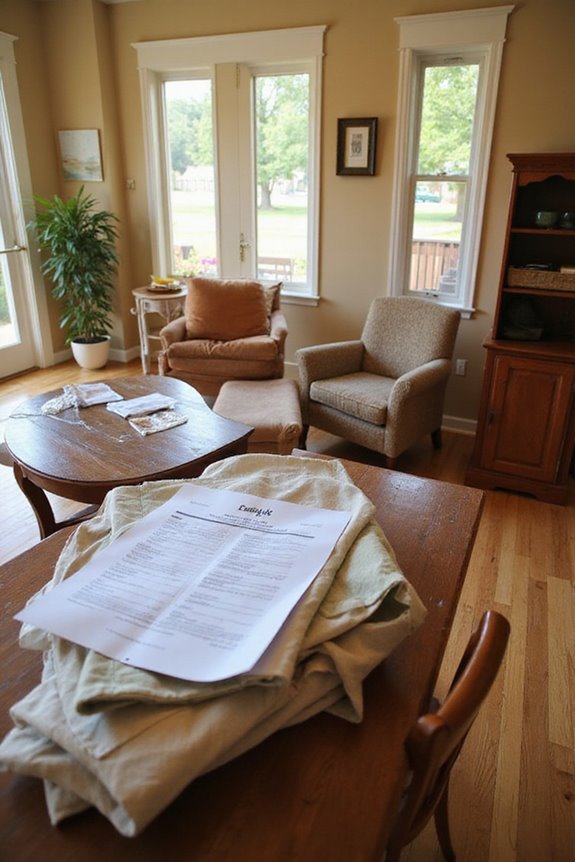Donating furniture to Goodwill is super easy! First, check that your items are clean and in good shape—no major rips or stains, right? Once you’re good to go, locate your nearest Goodwill using their online tool. You can either drop off your furniture or schedule a pickup for bulky stuff. Isn’t that convenient? And, by donating, you’re helping the planet too! Want to know more about what to prepare and how to estimate value?
Key Takeaways
- Assess your furniture for condition, ensuring it’s clean, functional, and safe for donation without major stains or tears.
- Locate your nearest Goodwill donation center using their online tool and check their hours of operation.
- Schedule a pickup for bulky items by contacting your local Goodwill and follow their instructions for large donations.
- Obtain a signed donation receipt for tax purposes, including the date and descriptions of your donated items.
- Remember that donating furniture helps those in need and reduces landfill waste, benefiting the environment and your community.
Assessing the Condition of Your Furniture

When you’re ready to donate furniture, you might be wondering, how do I know if it’s in good enough shape? Start with a quick condition evaluation. Is there any wear and tear? Look for stains or rips that make it less appealing. Then, don’t forget the functionality check! Does it still open, close, or support weight properly? If you can’t picture someone using it comfortably, it might not be donation-worthy. Also, verify there are no safety hazards, like sharp edges or wobbling legs. Remember, Goodwill wants items that are usable and safe! If it passes these checks, you’re on the right track! Many vintage wooden beds, for example, are known for their robust solid wood construction, making them great candidates for donation. Feeling upbeat about donating? You should be—you’re making a difference!
Cleaning and Preparing Your Furniture for Donation

Before you hand over your furniture to Goodwill, it’s important to clean and prepare it properly—after all, the better shape it’s in, the more value it holds! Start with a thorough cleaning; no one wants to take home a dusty couch, right? Remove any stains and fix minor issues like loose screws—these furniture maintenance tips go a long way!
Check that there are no personal items left behind. Did you forget a remote in that armchair? Oops! If you’ve got large pieces, consider disassembling them for easier transport; just make sure to keep parts together and label ’em. Additionally, ensure the furniture is made of durable materials that can withstand everyday use, as this adds to its longevity and appeal. Follow your donation preparation checklist to guarantee everything’s set, and you’ll be ready to make someone’s day! How great is that?!
Understanding Goodwill’s Acceptance Policies

Understanding Goodwill’s acceptance policies can feel a bit like trying to solve a puzzle, but don’t worry; it’s not as tricky as it sounds! Goodwill accepts various furniture types, like sofas, chairs, and kitchen sets, as long as they’re in sellable condition. What does that mean? Your items should be clean, free of major stains or tears, and maybe even a bit stylish! Keep in mind there are donation limits based on location and floor capacity. Some places might restrict how many pieces you can drop off at once. If you’re unsure about anything, just give your local Goodwill a quick call. Additionally, consider donating vintage kitchen tables that can add timeless charm to someone else’s home. Isn’t it nice to know your donations can help others while keeping our planet a little greener?
Checking Local Guidelines for Furniture Donations

Whether you’re sprucing up your living room or just decluttering, checking local guidelines for furniture donations is a must! Did you know that each Goodwill store has different local donation policies? It’s essential to reach out and find out what furniture they accept. For example, most places want items in good condition, clean, and ready for resale. You might be thinking of that beautiful old sofa, but remember, large pieces may be limited due to space constraints!
And what about those furniture donation benefits? Donating helps your community while possibly giving you a tax deduction! So, call your local Goodwill first to confirm what items they’ll happily take. Additionally, consider donating vintage patio furniture which can enhance outdoor spaces and be a valuable addition for others. Happy donating!
Arranging for Donation Drop-Off or Pickup

Once you’ve confirmed what furniture your local Goodwill will accept, it’s time to figure out how to get those items to them! First, consider finding local donation centers using Goodwill’s online locator tool. Just enter your city or zip code, and voila! You’ll find the nearest location and its hours—usually between 9 AM and 6 PM.
If the items are too bulky to transport, don’t sweat it! Scheduling pickup services is a breeze. Simply contact your local Goodwill directly via phone or email to see if they offer this option. They might have specific instructions, but it’s worth it for those heavy couches! Vintage storage benches, for example, often require specific instructions for assembly due to their size and weight. So, are you ready to make a difference? Let’s get that furniture donated!
Requesting a Donation Receipt for Tax Purposes
When you donate furniture to Goodwill, don’t forget to snag a donation receipt—it’s your golden ticket for tax deductions! This receipt, signed by the Goodwill employee, provides essential details like the date and a description of your donated items. Why’s this important? Because it substantiates your tax deductions, helping you keep more cash in your pocket come tax season!
Make sure you store that donation receipt securely; you’ll need it for your records! And remember, Goodwill doesn’t keep a copy, so it’s all on you to hang onto it. Got questions about valuation? It’s always smart to consult a tax advisor for the best results. Happy donating and happy saving! 🎉
Estimating the Fair Market Value of Donated Items
Estimating the fair market value (FMV) of your donated furniture is key to ensuring you’re claiming the right tax deductions! So, how do you go about this value estimation? Start by checking online marketplaces like eBay or local thrift stores—these can really help you gauge what similar items are selling for. Remember, the condition of your furniture plays a big role, too! Items in great shape have a higher FMV—so keep that in mind when evaluating. If you’ve got something really valuable, like that vintage chair collecting dust, consider hiring a professional appraiser. You want to make sure you’re giving yourself credit where it’s due, right? After all, those deductions can add up!
Exploring Alternatives to Goodwill for Donations
Have you ever wondered what other options exist for donating your furniture besides Goodwill? Well, there are some fantastic alternative charities out there! Habitat for Humanity ReStores, for instance, accept gently used furniture and help fund affordable housing projects. Pretty cool, right?
You might also consider The Salvation Army, which offers free pick-up and supports various social services. It’s a win-win for you and those in need!
And don’t forget about The Furniture Bank Network; they provide furniture directly to families facing hardships! Plus, if you’re looking into furniture recycling, check out GreenDrop. They specialize in efficient donation pick-ups! So, why not explore these alternatives? You could really make a difference!
Responsible Disposal of Unaccepted Furniture Items
You probably had some great ideas for donating your furniture to Goodwill, but what happens when they can’t accept your items? First off, don’t sweat it! There are plenty of responsible disposal options out there. Think about using local junkyards or waste management services for disposal. You might even discover charitable organizations that accept what Goodwill won’t, so keep an eye out! Ever thought about selling or giving away your items online? It’s a fantastic way to extend their life.
Also, consider furniture recycling programs—they help repurpose materials like wood and metal. And hey, partnering with your community can make this easier! Curious about how you can be part of those efforts? Let’s keep our planet happy! 🌍
Understanding the Environmental Impact of Donations
When you donate furniture, not only are you helping those in need, but you’re also making a significant impact on the environment! Did you know that each item you donate can help reduce landfill waste? It’s true! Around 12 million tons of furniture waste end up in U.S. landfills every year, polluting our soil and air. Your donation keeps usable pieces in circulation, reducing the energy and resources needed for new products. Imagine saving enough energy to power your TV for two years just by reusing a three-piece suite! Plus, donating furniture allows you to play a role in a circular economy, boosting both social good and those great environmental benefits, too. Isn’t that an awesome way to declutter?
Frequently Asked Questions
Can I Donate Furniture With Minor Scratches or Damage?
Yes, you can donate furniture with minor scratches or damage, depending on your local Goodwill’s donation guidelines. It’s best to check their policies regarding acceptable furniture conditions to confirm your donation’s appropriate.
Does Goodwill Accept Upholstered Furniture?
Imagine donating your beloved armchair, only to find it’s not accepted. Goodwill’s strict donation guidelines hinge on furniture condition; guarantee your upholstered items are spotless and undamaged before you take them in for donation.
Are There Limits on the Number of Items I Can Donate?
Yes, there’re limits on the number of items you can donate at Goodwill. Check the donation guidelines for specific location item restrictions, as each store has different capacities for accepting donations.
What Identification Do I Need to Donate Furniture?
You won’t need identification to donate furniture; just know Goodwill’s donation guidelines. Make certain your acceptable items are clean, sturdy, and sellable. Follow local policies, and you’re ready to contribute to the community!
Can I Request to Have My Furniture Picked up on a Specific Date?
You can request a specific date for your furniture pickup, but availability might vary. It’s best to check with your local provider when scheduling donations to guarantee your preferred date can be accommodated.




